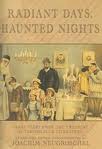 Radiant Days, Haunted Nights: Great Tales from the Treasury of Yiddish Folk Literature (Overlook Press) presents an intriguing collection of obscure Yiddish folk tales, translated for the first time by Joachim Neugroschel and spanning more than four centuries. The collection begins with the midrashic “Song of Isaac,” written by an anonymous author about 1510, and concludes with numerous tales from Europe in the 1920s. Most of the contents date ostensibly from the early 20th century.
Radiant Days, Haunted Nights: Great Tales from the Treasury of Yiddish Folk Literature (Overlook Press) presents an intriguing collection of obscure Yiddish folk tales, translated for the first time by Joachim Neugroschel and spanning more than four centuries. The collection begins with the midrashic “Song of Isaac,” written by an anonymous author about 1510, and concludes with numerous tales from Europe in the 1920s. Most of the contents date ostensibly from the early 20th century.
Unlike traditional literary stories, folk tales are typically handed down the generations anonymously in multiple variants: they are the straw that talented writers often use to spin into gold. This collection boasts many famous authors — S. Ansky, Mendele Moykher Sforim, Der Nister, Sholem Aleichem, Sholom Asch — as well as many lesser names, offering many intriguing tales.
The anonymous “ Story of Bovo” dates from 10th-century Denmark and, as Neugroschel explains, was drawn from the Arabian Nights. It took 500 years to filter into Yiddish culture, initially as a mock verse epic, then as prose. It circulated widely in pamphlet form throughout the 19th century and was highly popular among Ashkenazim.
In “The Fish That Swallowed the Prophet Jonah,” Mendele Moykher Sforim offers a well-reasoned conjecture, supported by popular and scientific evidence, that the aforesaid sea-creature was a shark, not a whale as often supposed. Master humourist Sholem Aleichem makes a rare excursion into popular fantasy with “The Red Jews,” in which he describes a fictitious tribe who live beyond the Sambatyon River and have lost most of their Hebrew, except for a few words and phrases like “interest-free loan,” “cash on the barrelhead,” “charity,” “alms,” “le-khaim,” “mealtime” and “meshugge.”
Perhaps the most surprising inclusion is the anonymously-written “Sir Gawain,” dating from 1789, a Yiddish version of the popular Arthurian legend, retaining the same heroic knight but minus the Christian quest for the holy grail.
With this diverse assortment of tales, Neugroschel, an accomplished translator, opens a welcome gate onto a verdant but rarely visited pasture. ♦
© 2005






